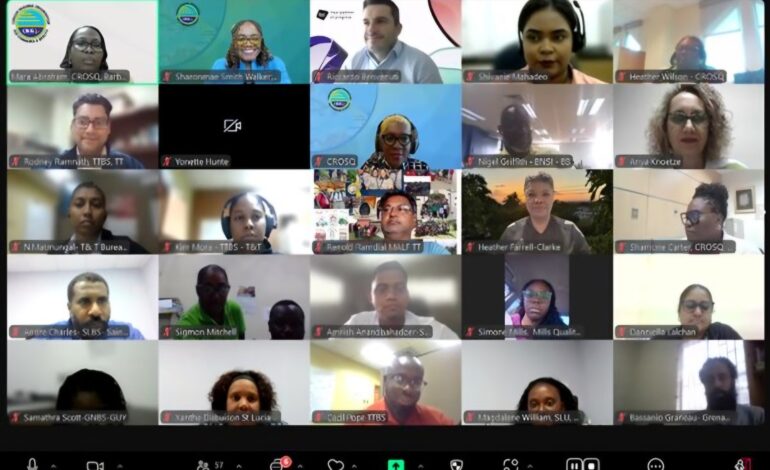
Bridgetown, Barbados — Chief Executive Officer of the CARICOM Regional Organisation for Standards and Quality, Dr. Sharonmae Smith Walker, has highlighted the importance of food safety standards to the Region’s food security, public health, and trade competitiveness. Speaking at a recent Food Safety Standards Webinar, co-hosted with the British Standards Institution (BSI) and the Saint Lucia Bureau of Standards (SLBS).
The virtual event held on Wednesday, February 26, brought together over 70 regional stakeholders, including National Standards Bodies (NSBs), food safety regulators, consumer associations, manufacturers, and other stakeholders. The objective was to introduce two national food safety standards developed by St Lucia with assistance from the BSI that could serve as stepping stones for a regional food safety standard for Pre-Requisite Programmes and Hazard Analysis and Critical Control Points (HACCP).
Dr. Smith Walker highlighted that food safety standards, including the two introduced, would support the revised CARICOM Heads of Government’s ‘25 by 2030’ goal of reducing the region’s food import bill by 25 percent, which was extended recently.
His Excellency Dr. Irfaan Ali, President of Guyana and Lead Head of Government with responsibility for agriculture and food security in the CARICOM Quasi Cabinet, made the announcement of the extension on Friday, 21 February 2025, at the 48th Regular Meeting of the Conference of Heads of Government of CARICOM in Barbados. He stated that uncertainties in the global trade arena and impacts from natural disasters in the Region are among the factors that have necessitated an extension to the initiative by five years.
Dr. Walker suggested that food safety standards help to meet this goal by facilitating smoother intra-regional trade of the best quality products and ensuring that food imports meet stated market requirements. Standards can thus unlock new trade opportunities by creating a unified framework for product compliance and helping regional products meet the stringent requirements of global markets.
Walker further underscored the importance of food safety standards in safeguarding public health. She cited data from the World Health Organization (WHO), which reports millions of cases of foodborne illnesses and deaths annually due to contaminated food. Many of these can be linked to non-compliance with international food safety standards. She highlighted that non-compliance also remains a leading cause of trade rejections at international borders and revenue loss for food exporters. These rejections can not only result in financial setbacks for companies but also damage the reputation of regional brands and industries.
The CROSQ CEO congratulated the Saint Lucia Bureau of Standards for their comprehensive review of international standards that guided the development process, leading them to become the first member state to produce this type of standard in the region. This development also garnered interest in the development of a regional food safety standard.
The webinar was hosted as part of the United Kingdom Foreign, Commonwealth & Development Office (UK FCDO)-funded Standards Partnership Programme. The standards are designed to help Micro, Small, and Medium Enterprises (MSMEs) implement food safety measures aligned with globally recognized frameworks such as Codex and ISO 22000.
Riccardo Benvenuti, Lead Project Manager at the BSI, expressed appreciation for the partnership with CROSQ and SLBS. He noted that while BSI and SLBS had worked to develop the standards since 2018, this was just the beginning of their work to introduce them to the region.
While these are not regional standards, CROSQ will review the feasibility of these national standards becoming a regional standard after consultation with its member states and remains committed to leveraging Regional Quality Infrastructure (RQI) to advance the revised CARICOM Heads of Government ‘25 by 2030’ goal.




